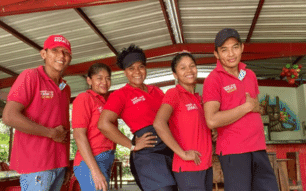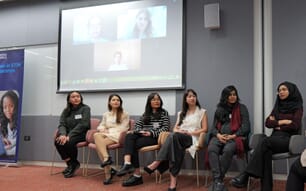What inspired you to pursue a career in aquaculture?
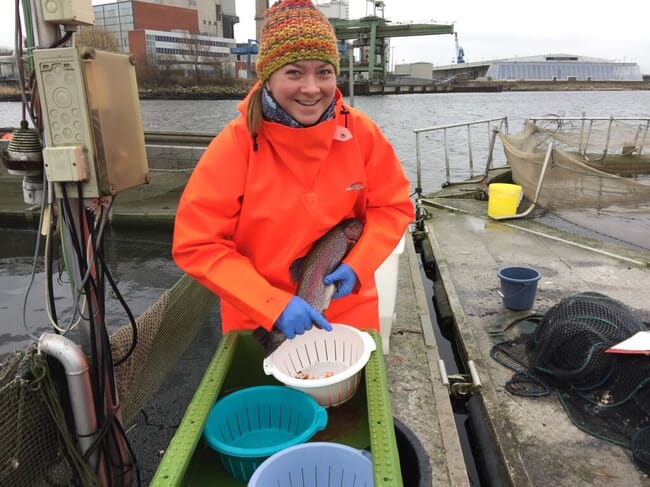
I studied biological oceanography at Kiel University and got hooked on aquaculture during my diploma studies when I visited French mussel farms on Île de Groix [in Brittany]. The passion of mussel farmers, like Patrick Saigot, combined with their ability to work on the sea – and with the sea – really touched me. They loved what they were doing, loved to eat what they were farming and loved to teach me, a German aquaculture greenhorn, without questioning my work.
The day I graduated people asked me what my plans were and my answer was, without thinking, “I will farm mussels and seaweed.”
However, the need to farm sustainably was really brought home by a trip to Qingdao in China. There, in a very pretty mudflat area with lovely nature, stretched shrimp ponds as far as my eyes could see. Building shrimp ponds had not only destroyed the natural beaches but may have also caused the mass algae blooms in the Yellow Sea which were in the media during the Olympic Games in 2008. It’s clear that aquaculture businesses require high-quality water and mustn’t put natural resources at risk.
What was your first dedicated aquaculture project?
After graduation I applied for funding for a research project to develop longline mussel production in the Kiel Fjord alongside an existing submerged seaweed farm. The seaweed farm was built in the late 1990s by the company Coastal Research & Management (CRM), which used seaweed (Saccharina latissima) for cosmetics. My passion grew with the difficulties and doubts we had to contend with. The economic feasibility and the biosecurity of food production in waters as busy as the Kiel Fjord were questioned more than once.
In fact, more than a century ago it was common business to farm mussels in this fjord – before the water quality significantly decreased due to increasing steamship traffic and shipyard installations – and the fishermen lost their mussel fields due to resettlement. Nevertheless, the water quality has increased significantly since then and all measurements showed that it was again possible to farm mussels for human consumption in the fjord. Having secured funding we were able to develop the first mussel farm in the German Baltic for over 100 years.
During this project I was able to write my dissertation about the integrated multi-trophic aquaculture (IMTA) of blue mussels (Mytilus edulis) and seaweed (Saccharina latissima). After my PhD thesis I realised that it was difficult to find a job in German marine aquaculture other than in research, because the industry here is so tiny. As a result I worked in research projects to promote sustainable aquaculture in the Baltic and the North Sea, where aquaculture development is still stagnating or even decreasing.
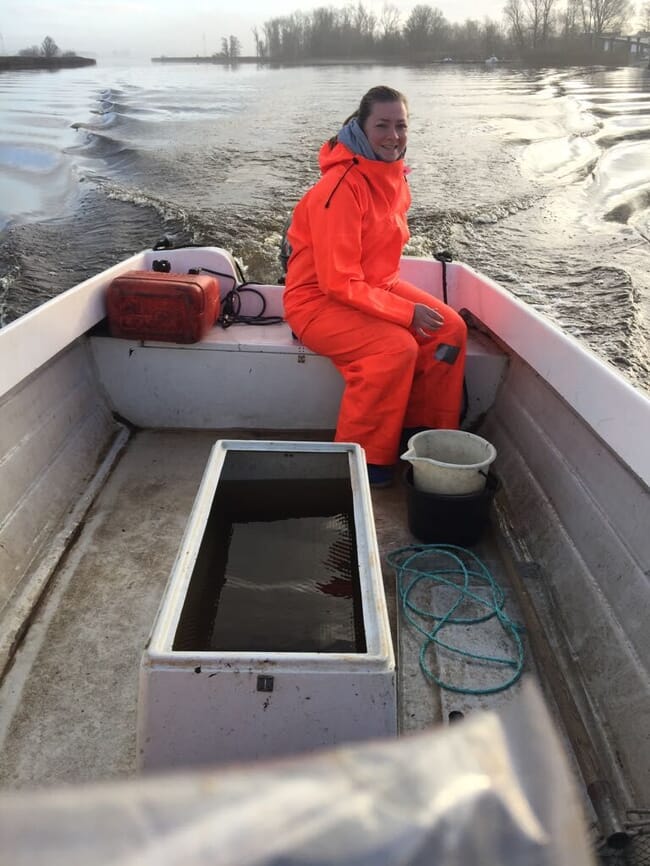
Describe a typical day in your current role.
At the moment I am working as marine aquaculture consultant, specialising in marine licensing procedures, funding opportunities and farm installation.
A typical day starts with breakfast for my family and a stop at the forest kindergarten where I drop my little one for half a day in the woods. Then I usually rush to my office, catch up with emails and do research for consulting. At the moment I am writing a licensing manual for German Baltic mussel culture for the Environmental Ministry of Schleswig-Holstein. This is interesting work and, although it sounds like dry stuff, it is actually very creative, because I feel like I can design the basis for future Baltic mussel aquaculture. I will be publishing a nice practical manual in the coming months.
However, the most satisfying days are those spent out on the water – with my hands on fish, mussels or seaweed. That’s why I want to be a fish farmer in future.
Please can you tell us a little more about the marine fish farm you’re currently involved with?
Germany only has one marine finfish farm – a trout producer in the Kiel Fjord. Tassilo Jäger, the owner of the Kieler Lachsforelle, is planning to retire soon and I hope to take over the farm and run it with a friend.
The farm has been producing rainbow trout (Oncorhynchus mykiss) for almost 40 years. The farmer is a fisheries biologist who, together with other biologists, took it over following the completion of their research project at the Institute for Marine Research (IMF) in the 1980s. The others left the company after a couple of years, leaving him in sole charge.
The farm still consists of circular cages that were designed by Harald Rosenthal in the 1980s and the design has a number of flaws, leading to problems caused by biofouling and it requires considerable maintenance. Also the original intention of the farmers – to buy juvenile fish in spring to be harvested en masse in the autumn – was too risky from a marketing perspective. As a result he decided to sell his trout year-round, directly to the local market – managing to keep the risks low and the price high.
Our most important intentions for the farm are to continue the founders’ good work and to integrate it with extractive organisms like blue mussels and seaweed, so we can run it in a manner that’s not only economically but also ecologically sustainable.
As well as the 15-tonne trout farm we plan to add another endemic salmonid species (Coregonus maraena) to the farm’s portfolio. Although not yet farmed in large quantities in the western Baltic Sea, this omnivorous species is commercially valuable.
Another important part of our vision is to use the farm as an in situ research platform for regional research institutions. Sustainable aquaculture, and the knowledge that underpins it, must be pushed forward in Germany. As the only existing marine-fish farm in Germany we will provide the basis to collect technical, ecological, legal and economical experiences for future fish farmers through research projects.
Due to the age of the equipment on the farm we need to invest in new infrastructure and will be looking for at least four new rectangular net cages, vessel adjustments and a new processing plant. We will also be looking into modern marketing strategies such as online and community marketing techniques.
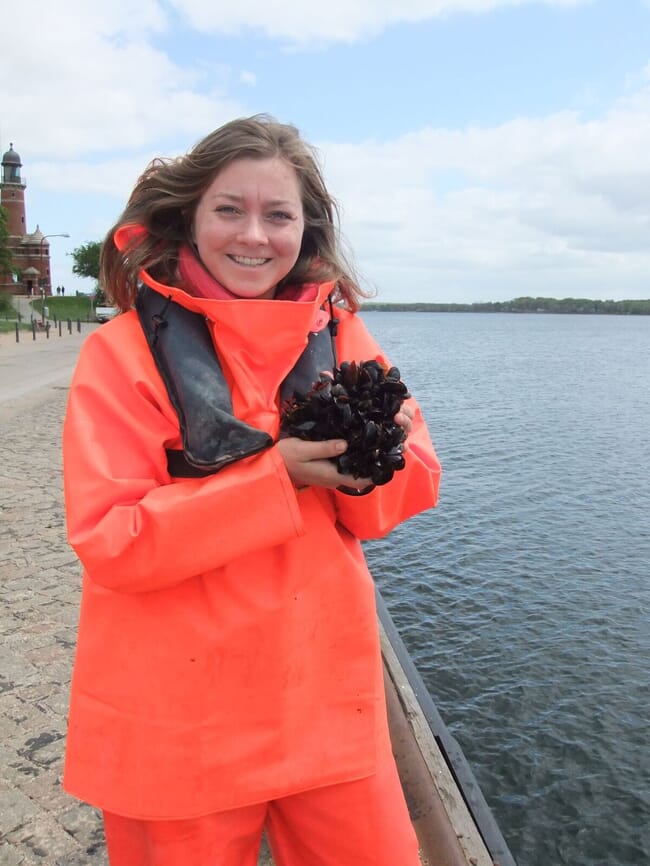
Are you able to put your academic training to use when engaging in practical aquaculture projects?
My studies and PhD thesis give me confidence when in discussion with the authorities, for example, but they didn’t include any practical aquaculture training.
Are there any individuals or organisations who you’ve found particularly inspirational?
My mother inspired me most. She set up her own business despite having three children at home and an unemployed husband. She gave me the strength to believe in myself and always encouraged me in all my decisions.
I’m also grateful for the photographer I was apprenticed to for three years before beginning my biology studies, who taught me key business skills and the value of being loyal to a company.
CRM inspired me to work with, and for, the sea by practising sustainable aquaculture. They sent me to France to learn mussel cultivation and they gave me the opportunity to install the Kiel mussel farm. My former trainee from this time, Tim Staufenberger, now runs the mussel farm I developed and we are still good friends. There are many more that spring to mind – not least all the mussel farmers and fish farmers I’ve ever met, who have all inspired me with their passion for their work and products. They are providing a valuable environmental service to society without seeking government subsidies.
Have you faced any particular challenges as a woman in aquaculture?
I’ve felt that, as a woman, I’ve found it easier to be diplomatic in difficult situations and discussions, but being a working mother in aquaculture research does present challenges. Research projects – with their meetings, lectures and conferences – are just not designed for mothers. I did not experience this in the industry – mostly because meetings are short, effective and generally take place during normal office hours.
What advice would you give to women looking to start a career in the aquaculture sector?
Be honest to yourself and your environment. Ask for help and be grateful. Be fearless and have fun with your work. Be patient and remain confident that everything will be fine.
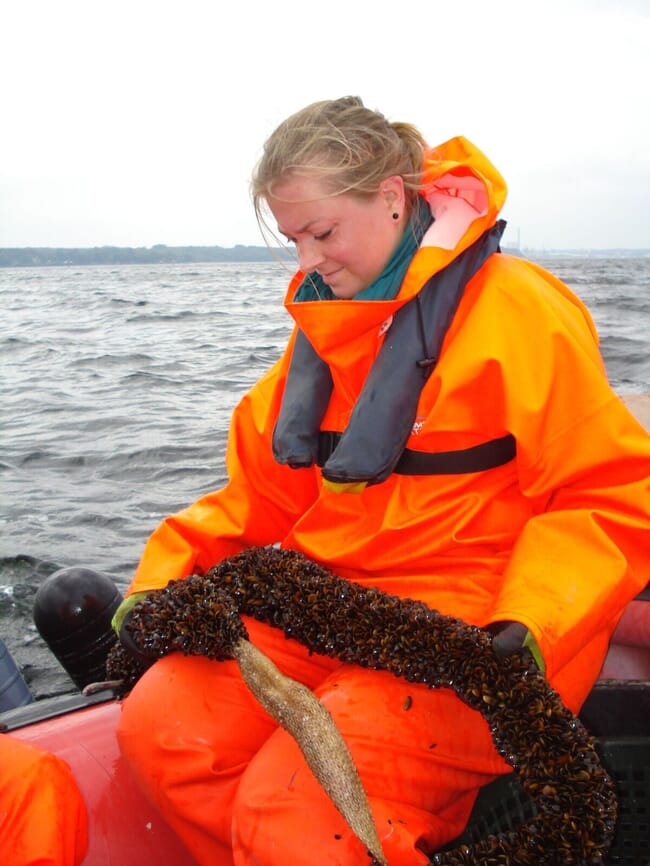
What has been the aquaculture industry’s greatest accomplishment in recent years?
I think the greatest accomplishment is the high quality of food and the feeding techniques that are available for fish farming. These not only improve fish health but also lessen nutrient emissions. Also the effort to replace fishmeal and fish oil in fish feed has produced valuable feeds and offers great hope for the world’s decreasing fish stocks.
What outstanding challenge would you most like to solve?
There is still only one mussel farm in the German Baltic – the one I built during my PhD thesis. It now sells organic certified blue mussels for a premium price, which makes me proud, but I would like to convince the German environmental ministry that mussel farming is also a valuable tool for combatting eutrophication in the Baltic.
Do you think that there are ways of rejuvenating aquaculture production in countries such as Germany, in which the industry has stagnated?
Yes, there are ways, but barriers need to be broken and attitudes changed – the authorities need to be made aware of the benefits and sustainable nature of many aquaculture systems.
I also think that emphasising increased self-sufficiency in food production would help promote the development of sustainable aquaculture in Germany. Why, for example, should we import tiger prawns from Vietnam if we can produce them in RAS – which has a lower environmental footprint and can provide a better product quality – in Germany.


